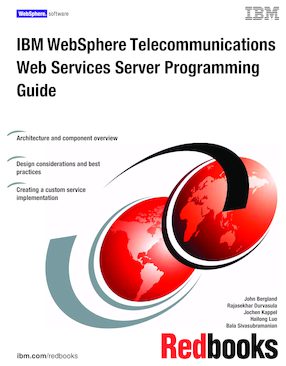IBM WebSphere Telecommunications Web Services Server Programming Guide
An IBM Redbooks publication
Note: This is publication is now archived. For reference only.

Published on 15 September 2008
ISBN-10: 0738431427
ISBN-13: 9780738431420
IBM Form #: SG24-7589-00
Authors: Bergland John, Rajasekhar Durvasula, Jochen Kappel, Hailong Luo and Bala Sivasubramanian
This IBM Redbooks publication is a programming guide that provides developers with the information they need to create new Web service implementations for IBM WebSphere Telecommunications Web Services Server.
IBM WebSphere Telecommunications Web Services Server allows you to expose high-level Web service interfaces to network services for third parties.
Third parties are typically external service providers, customers, or organizational divisions that want to develop new services that integrate with the service provider network infrastructure. Web service interfaces provide access to service capabilities in a programming language and technology independent way. Each Web service interface can have multiple back-end implementations for connecting with a service provider's environment. For example, a Web service interface may connect to a service provider's network through the Session Initiation Protocol (SIP), using a Parlay Connector through a Parlay Gateway, through native service provider protocols, or using custom integrated services.
In this IBM Redbooks publication, we provide specific references, best practices, guidance, and implementation examples for programming IBM WebSphere Telecommunications Web Services Server components and customize it for your organization's particular needs. More specifically, we discuss the following items within the context of a common example scenario:
- Working with the Service Policy Manager and creating a custom policy
- Working with the Access Gateway to make modifications to a default mediation flow, create a custom mediation primitive, or create a completely new mediation flow from scratch
- Creating a custom Parlay X Service Implementation, which is based on creating the Publish ( ) operation within a Presence Supplier interface.
Chapter 1. Introduction to the IBM WebSphere Telecommunications Web Services Server
Chapter 2. Architecture, components, and tooling
Chapter 3. Working with service policies and the Service Policy Manager
Chapter 4. Design considerations for Access Gateway flows - base mediation flows and the mediation primitives
Chapter 5. Developing and customizing a custom Access Gateway flow
Chapter 6. Common components
Chapter 7. Design considerations for the service implementation
Chapter 8. Developing the service implementation
Appendix A. Developing custom common components
Appendix B. Developing service provider integrations
Appendix C. Developing a Usage Record Billing Mediator common component
Appendix D. Sample Usage Record cleanup program
Appendix E. Additional material